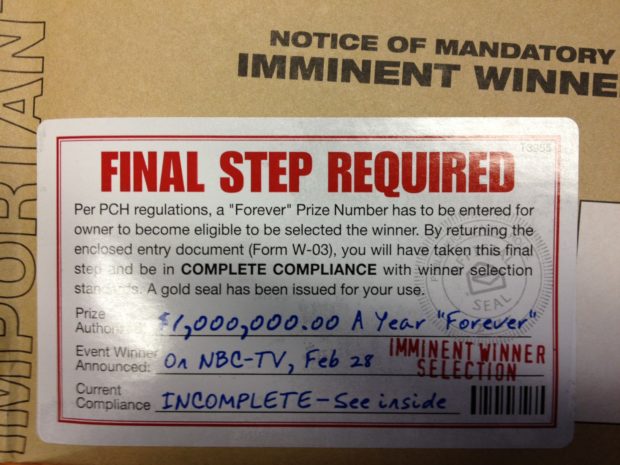Written by: Greg Ellifritz
I responded to a heartbreaking call at work last week. No, it wasn’t a murder or child abuse. It was a financial crime. An elderly man in my city was scammed out of more than $100,000. That’s right $100K.
I take financial scam and fraud reports fairly regularly. I had personally never taken any reports with losses more than about $10,000 in the past. Losing $10,000 would be horrible, but I couldn’t imagine losing more than $100K in just a couple weeks. The elderly victim will never get the money back and we will likely never catch the criminals. That’s why it’s such a heartbreaking crime. It’s a huge loss that will never be reimbursed. And the criminals will remain free to keep on scamming other folks out of similar amounts of money.
Here are the details of the scam and some ways to prevent it:
The elderly Asian immigrant with somewhat limited English speaking abilities received a fax on his business fax machine. The fax bore the letterhead of “Publisher’s Clearinghouse.” The text of the fax explained that the recipient had won a sweepstakes valued at $15.3 million dollars. In order to redeem the prize, the recipient was required to call a listed phone number (which ends up being an untraceable number that originates from outside the USA).
When our victim called, he was informed that he had won the prize. The scammers gathered some personal information from the victim and then told him that they couldn’t release the money until he paid $300,000 in state income taxes. The scammers then sent additional “official” faxes verifying this information. One fax was from “Publisher’s Clearinghouse.” The other bore the logo of the Ohio Department of Taxation. Both said that the victim owed $300,000 in taxes and gave instructions for payment.
The scammers instructed the victim to make several increasingly larger payments. The payments were to be sent to various addresses around the country. All payments were to be in cash money, shipped by FedEx next day services.
The elderly resident’s large cash withdrawals from his bank account raised suspicions at his bank. When he explained what was happening to the bank tellers, the tellers told him that he was being scammed. He didn’t believe the bank employees because he had the “official” documents. Bank employees eventually called the police in the hopes that we would be able to convince the victim that he was being scammed. Unfortunately, by the time we were called, he had already sent more than $100,000 in cash to people he didn’t know. It took me and our financial crimes detective about 20 minutes just to convince the man that he wouldn’t be getting a $15 million dollar check next week.
Scam artists like the folks who targeted the resident in my city prey on elderly people and people who are desperate to believe that they deserve a prize. If that description fits anyone in your family, make sure they know the following facts:
1) If the deal sounds too good to be true, it probably is.
2) Scam artists can make up very convincing documents. Just because something is in writing doesn’t mean it is true.
3) No one should ever give any personal information out to people they don’t know. If anyone gets a random phone call, they should not answer questions about their names, addresses, dates of birth, or family member names. All that info is used by the scammers to create a more plausible story or more realistic documents to convince you to buy into the scam.
4) If anyone asks for money in advance (for whatever reason) before you win a “prize,” it’s a scam.
5) Legitimate organizations don’t require that you ship them cash via Fedex. Legitimate organizations take credit cards or checks. If anyone demands payment in cash, prepaid credit cards, or “Green Dot” money cards, it is a scam.
Most of you understand this basic advice. But it is obvious that the resident in my city didn’t. One person’s failure to accept reality netted these criminals more than $100K. That’s how they stay in business. It only takes one person in 1000 to make a mistake and then the criminals get paid.
Please make sure your elderly friends and family members know how to avoid scams like this. You don’t want someone you care about to be the one in a thousand who falls for a scam like this.
If you would like to read more articles like this one, please sign up for my email updates.


